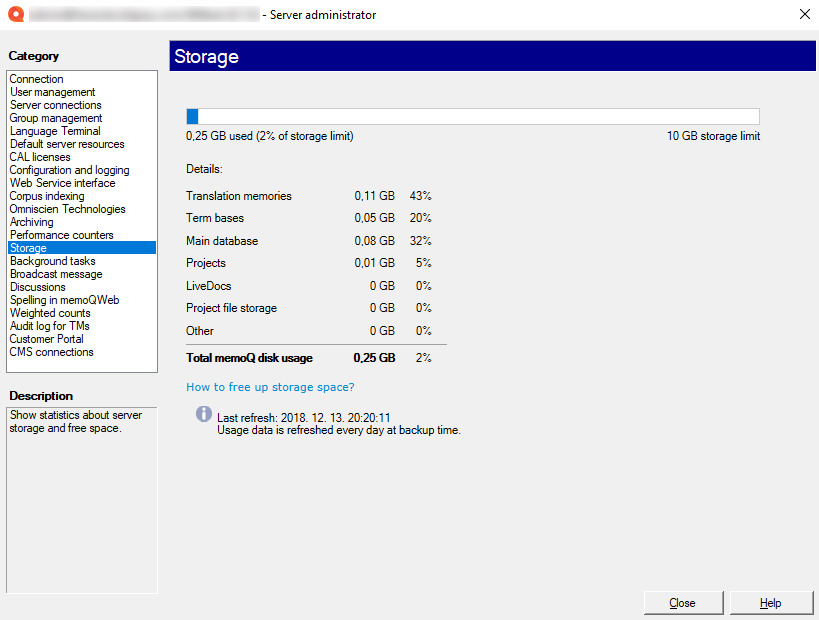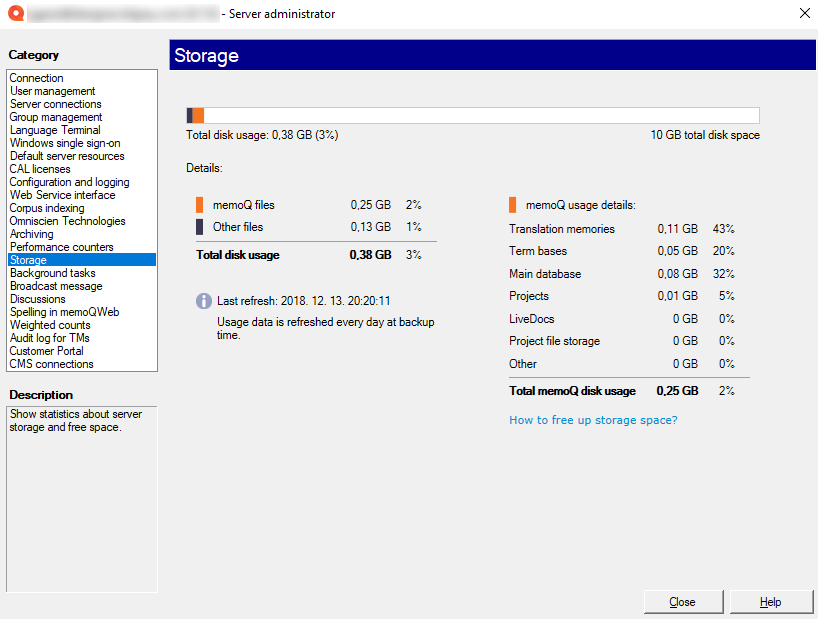Server administrator - Storage
For memoQ cloud, disk space is limited. At the time of writing (Q3 2022), memoQ cloud instances have 10GB, and memoQ cloud+ instances have 20GB.
memoQ servers installed on your premises or hosted by memoQ Zrt. do not have this limit, but the Storage pane still tells you how much disk space memoQ is using.
You need the project manager edition of memoQ to manage a memoQ server or a memoQ cloud.
You may manage the server only if you are a member of the Project managers or Administrators group on the memoQ server. To change most settings, you must be member of the Administrators group.
How to get here
-
At the very top of the memoQ window: Click the Server Administrator
 icon.
icon. Or: On the Project ribbon, click the Server Administrator
 icon.
icon. Cannot see the icon? At smaller window size, not all the icons fit on the ribbon. In the memoQ Server section, click the folder
 icon, then click Server Administrator.
icon, then click Server Administrator.The Server Administrator window opens.
-
Under Category, click Storage. The Storage pane appears.

Storage pane on a memoQ cloud

Storage pane on a memoQ server or hosted memoQ server
What can you do?
You can see how much space the different kinds of data (translation memories, term bases, etc.) take up. If this is over 80% of your storage, the blue bar (on memoQ cloud) or the Total disk usage information (on a hosted memoQ server) shows in yellow. Over 90%, they show in red. If you go over your memoQ cloud's storage limit, you cannot do anything before freeing up enough space.
When your usage is high, or you are using up your space fast, memoQ server sends e-mail warnings to the administrator. When your usage is over the limit, memoQ also shows warnings to project managers when they open a project.
How to free up storage space
Find out what kind of data causes the problem.
- Projects and documents: There can be more than one reason:
Lots of old or unused projects: On the memoQ Dashboard, select unneeded projects and on the ribbon, click Archive. In the memoQ archive projects wizard, type a folder path on your computer, or click Browse, and go to the folder you want to save the project archives. Archiving deletes the projects from your memoQ server or memoQ cloud.
You have to do this manually: Currently, the automated archiving actions in project templates put the archives on the same memoQ server. If you are using such automated actions, ask memoQ Support for help.
A few huge unfinished projects: Export unused or finished files to MQXLZ format, and remove them from the project.
- Translation memories:
- Unused or rarely used TMs: On the Resource console, delete these (you may want to export into TMX first), or remove them from the memoQ server (make sure to clear the Keep the remote copy after creating a local copy successfully check box). Removed TMs can be shared on the server again when needed.
- TMs used for a long time: In the Translation memory editor, use the Remove duplicates button. Or, filter for TM entries which are older than a date you choose, then export them to your computer, and delete them from the TM. You can also remove segments that contain only numbers or tags: run a QA on the TM to find them.
- Term bases:
- Lots of images: Resize the images to make the term base smaller.
- Lots of duplicate entries: This can occur if you import the same content (for example, an updated version of the same term sheet) regularly. In the Term base editor, use the Remove duplicates button.
- LiveDocs: On the Resource console, remove unused corpora from the memoQ server. Just like TMs, you can share removed corpora on the server when needed.
- Project file storage: These are the documents exported from memoQ online projects. Download them to your computer and delete from the memoQ server or memoQ cloud. If you have a memoQ cloud, ask memoQ Support team for help.
Find more explanations and tips in the Keeping your memoQ cloud slim guide.
When you finish
To return to memoQ: Click Close.
Or, choose another category to manage:
- Connection (choose this to manage a different server)
- User management
- Server connections
- Group management
- Language Terminal
- Windows single sign-on
- Default server resources
- CAL licenses
- ELM licenses
- Configuration and logging
- Web service interface
- Corpus indexing
- Omniscien Technologies
- Archiving
- Performance counters
- Storage
- Background tasks
- Broadcast message
- Discussions
- Spelling in memoQWeb
- Weighted counts
- Audit log for TMs
- Customer Portal
- CMS connections